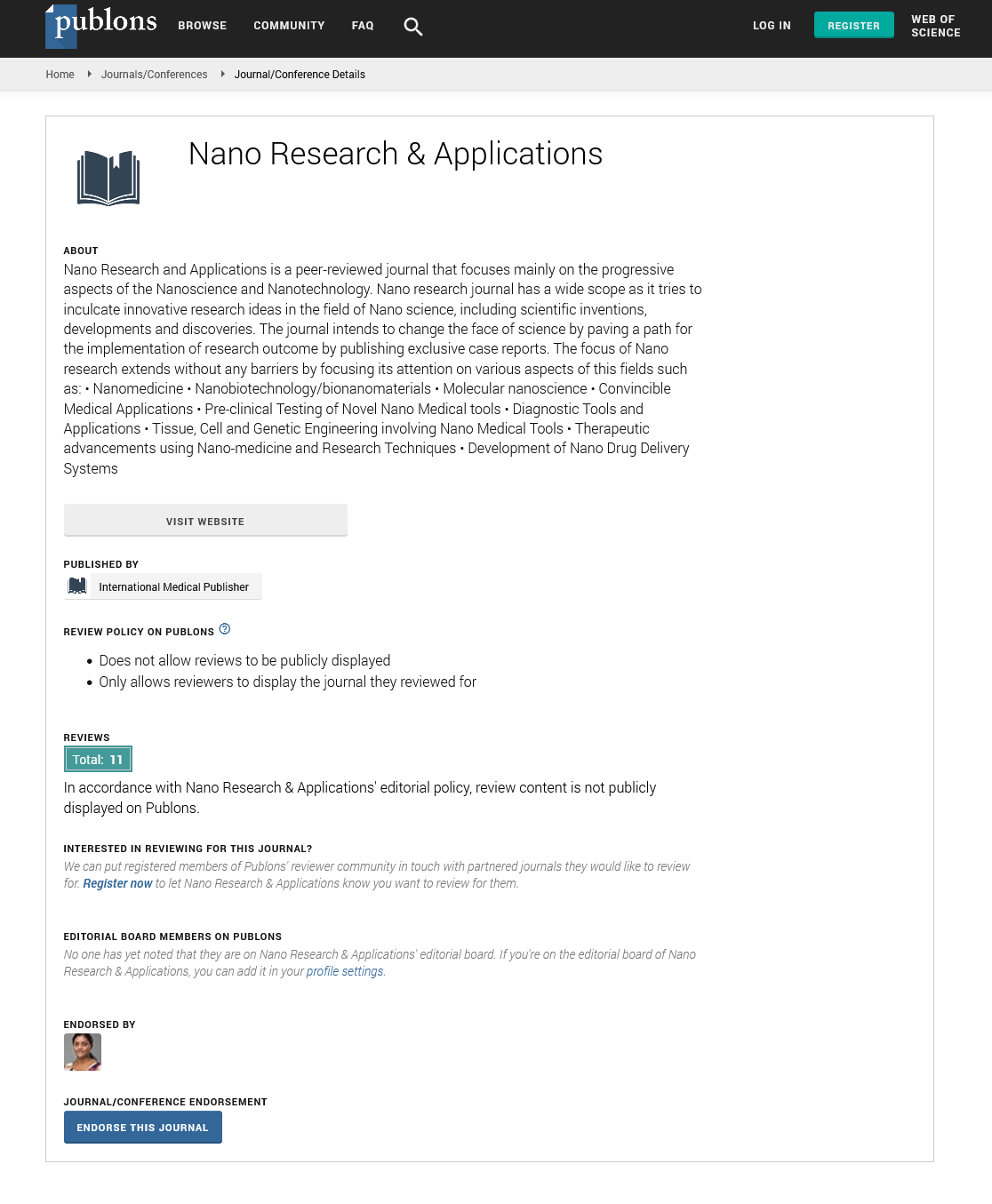ISSN : 2471-9838
Nano Research & Applications
Overview of nanotechnology applications with focusing about agricultural sector
International Meeting on Advanced Nanomaterials and Nanotechnology
November 07-08, 2017 Singapore
Zakaria Fouad Fawzy Hassan and Shaymaa I Shedeed
National Research Centre, Egypt
ScientificTracks Abstracts: Nano Res Appl
DOI: 10.21767/2471-9838-C1-005
Abstract
Attempts to apply nanotechnology in agriculture began with the growing realization that conventional farming technologies would neither be able to increase productivity any further nor restore ecosystems damaged by existing technologies back to their pristine state; in particular because the long-term effects of farming with ├ó┬?┬?miracle seeds├ó┬?┬Ł, in conjunction with irrigation, fertilizers, and pesticides, have been questioned both at the scientific and policy levels, and must be gradually phased out. Nanotechnology in agriculture has gained momentum in the last decade with an abundance of public funding, but the pace of development is modest, even though many disciplines come under the umbrella of agriculture. Specifically in agriculture, technical innovation is of importance with regard to addressing global challenges such as population growth, climate change and the limited availability of important plant nutrients such as phosphorus and potassium. Nanotechnology applied to agricultural production could play a fundamental role for this purpose and research on agricultural applications is ongoing for largely a decade by now. This also touches on the issue of nanotechnology in developing countries. Despite these potential advantages, the agricultural sector is still comparably marginal and has not yet made it to the market to any larger extent in comparison with other sectors of nanotechnology application. Nanotechnology devices and tools, like nanocapsules, nanoparticles and even viral capsids, are examples of uses for the detection and treatment of diseases, the enhancement of nutrients absorption by plants, the delivery of active ingredients to specific sites and water treatment processes. The use of target-specific nanoparticles can reduce the damage to non-target plant tissues and the amount of chemicals released into the environment. Nanotechnology derived devices are also explored in the field of plant breeding and genetic transformation. Recent Publications El Bassiony A M, Z F Fawzy, G S Riad and A A Ghoname (2014) Mitigation of High Temperature Stress on Growth, Yield and Fruit Quality of Tomato Plants by Different Shading Level. Middle East Journal of Applied Sciences; 4(4): 1034-1040. Li Yunsheng , El-Bassiony A M, El-Awadi M E, Fawzy Z F (2015) Effect of Foliar Spray of Asparagine on Growth, Yield and Quality of Two Snap Bean Varieties. Agricultural and Biological Sciences Journal; 1(3): 88-94. Fawzy Z F, El- Bassiony A M, Neama M Marzouk and M F Zaki (2016) Comparison of nitrogen fertilizer sources and rates on growth and productivity of squash plants. International Journal of PharmTech Research; 9(8): 51-57. Fawzy Z F, Shaymaa I Shedeed, Nagwa M K Hassan (2016) A Review of Organic Agricultural of Some Vegetables Crops. American Journal of Food Science and Health; 2(3): 25-31. Gamal S Riad, Abdalla A Ghoname, Amira M Hegazi, Zakaria F Fawzy, Maged A El-Nemr (2017) Cultivation in Rice Straw and Other Natural Treatments as an EcoFriendly Methyl Bromide Alternative in Head Lettuce Production. Gesunde Pflanzen; 69: 21-28.
Biography
Zakaria Fouad Fawzy Hassan is the Professor in the Agriculture and Biological Division, National Research Center since 2013. Also, he is Assessor in the Egyptian Accreditation Council. He is the Former President of the Youth Scientific Research Association. He has published five scientific books and more than 45 scientific research paper. He has contributed significantly to the expansion of knowledge of organic agriculture and climate changes issues through public lectures on scientific research centers and various Egyptian and Chinese universities.
Google Scholar citation report
Citations : 387
Nano Research & Applications received 387 citations as per Google Scholar report
Nano Research & Applications peer review process verified at publons
Abstracted/Indexed in
- Google Scholar
- China National Knowledge Infrastructure (CNKI)
- Directory of Research Journal Indexing (DRJI)
- WorldCat
- Publons
- Secret Search Engine Labs
- Euro Pub
Open Access Journals
- Aquaculture & Veterinary Science
- Chemistry & Chemical Sciences
- Clinical Sciences
- Engineering
- General Science
- Genetics & Molecular Biology
- Health Care & Nursing
- Immunology & Microbiology
- Materials Science
- Mathematics & Physics
- Medical Sciences
- Neurology & Psychiatry
- Oncology & Cancer Science
- Pharmaceutical Sciences
